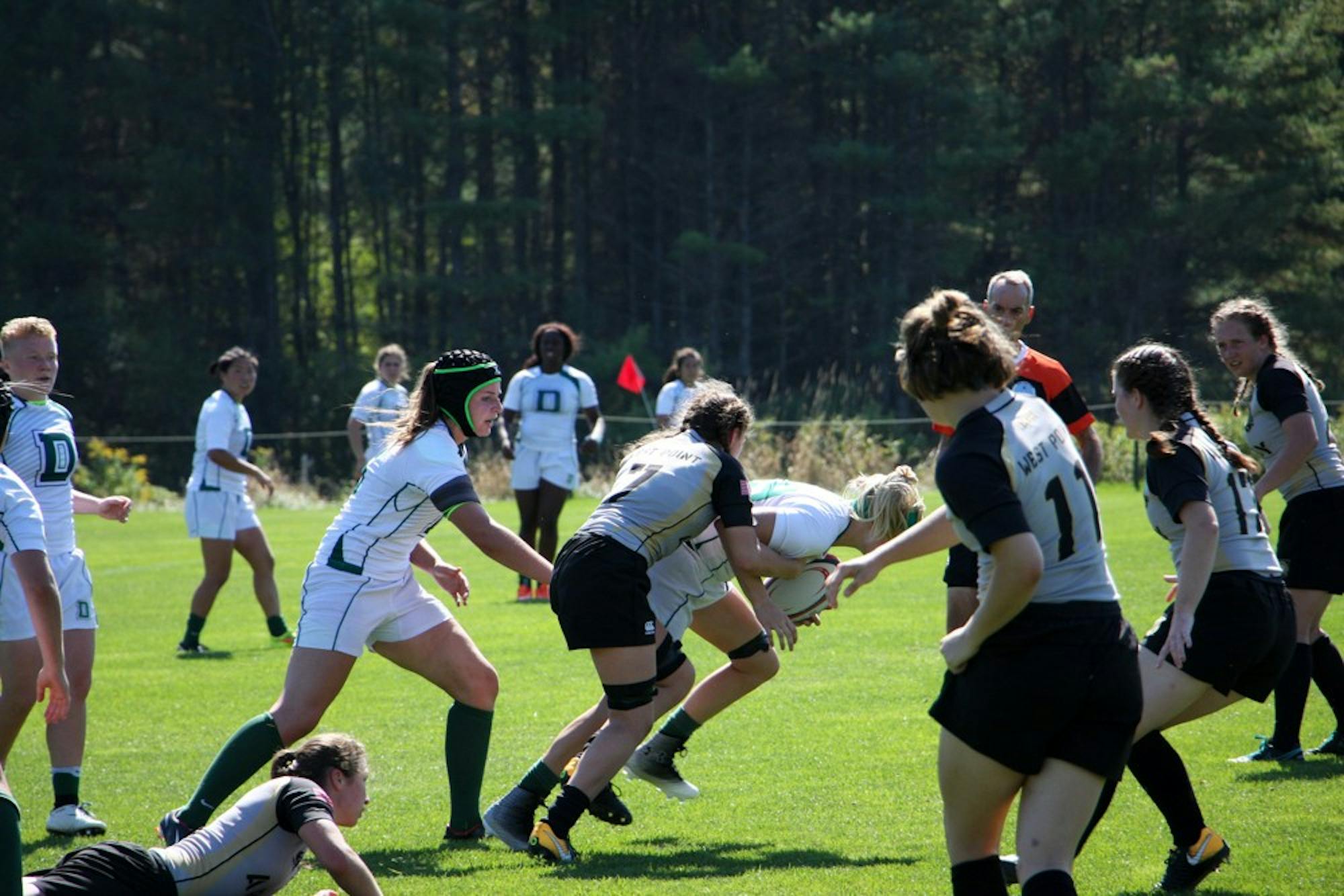With last Saturday’s 22-8 victory over Harvard University, the rugby team has now won three Ivy League Championships in the three years since it became a varsity program in 2015. Since the women’s rugby club transitioned to varsity status, the team has never looked better. The women are still undefeated, boasting a 15s campaign in which the Big Green won four games by more than 20 points.
The championship match was the second meeting between the Crimson and the Big Green this season. Dartmouth won the first matchup in Cambridge, Massachusetts by a score of 39-10. The championship match was closer.
“It was definitely a tough match,” co-captain Morgan McGonagle ’18 said. “It always is against Harvard.”
Head coach Katie Dowty spent the past two weeks after the mid-October match against Brown University drilling the team on offensive play. But against the Crimson, the Big Green found itself often playing defense more often than not. Even while winning the possession battle, Harvard struggled to make headway against a determined Big Green side. Three of the Crimson’s eight points came on a kick at the end of the first half. A lone try as time expired in the second half made up the other five points.
When Dartmouth did have the ball, it did not waste an opportunity to score. Co-captain Frankie Sands ’18 scored the first try on an interception just six minutes in and tacked on another in the 34th minute.
“When [Sands] intercepted a pass and scored a try, that’s what got the momentum going,” Kat Ramage ’19 said. “We were all like, ‘All right, we can do this.’”
Then the team began to work together more fluidly. Any rust from the two-week break had been brushed off. Becca Jane Rosko ’20 got into the try zone in the 24th minute following a Harvard penalty, before Sands scored her second of the game.
“Everything was coming together,” Idia Ihensekhien ’21 said. “We were playing more for each other … we tried to put ourselves in a position that was better for our teammates to succeed.”
Physically, the team worked on improving its fitness with every practice, incorporating strength-building and cardiovascular training, Ihensekhien said. The group paid particular attention to the movements of the game, tightening footwork and fixing small mistakes.
“We have a really good defense; that’s what we pride ourselves on … so [we’re] trying to clean that up and be as good as we can be,” Ramage said. “Offense is what we’ve been spending a lot of time on, trying to get everyone comfortable with moving the ball around the field.”
Mental preparation is also critical. To help the player find a balance between getting excited for a big game and getting carried away, the coaching staff makes sure the players have time to breathe, relax and visualize the upcoming competition.
“It’s like meditation,” Ihensekhien said. “We lie down and [assistant coach Stacey] Bridges will talk to us. We did it before the game, too, in the locker room … it slows your heart rate down [and] lets you focus.”
In addition to Dartmouth’s sustained success, Ihensekhien said the team focuses on having a high rugby IQ.
“We have a really good knowledge of the game,” Ihensekhien said. “There’s different parts of the game that we’re looking at that other teams aren’t.”
The team also makes a point of preparing heavily for the fall season months before the heavy competition, hammering out leadership details and internalizing motivational slogans during the spring. By the time the first-years arrive, the team identity is already set up and well-structured, so the real obstacle is helping them fit in with the team, whether they are recruits adjusting to college play or walk-ons learning the sport for the very first time.
“The freshmen aren’t joining a newly-developing team,” Sands said. “They’re walking into a place with solid values and a consistent, developed team atmosphere, and it doesn’t take long to catch onto the identity of the team.”
The players strive to build a program tied together by shared values.
“We obviously focus on being the best team and the best players, but we go about that by building really great people,” Sands said. “We really want to focus on your character and who you are as a person, because that’s what will transition over onto the pitch when we’re playing for 80 minutes. I want to play next to someone I trust 100 percent.”
The team atmosphere is one constant in the rugby team’s third year of varsity success. It’s not just a positive side effect of a great team — it’s a factor that really counts in deciding the strength of a team.
“All of us really vibe and love each other,” Ramage said. “I think that’s what sets us apart from other teams. When we’re out there on the field, we’re playing for each other, and that’s why we can push and play with so much heart.”




